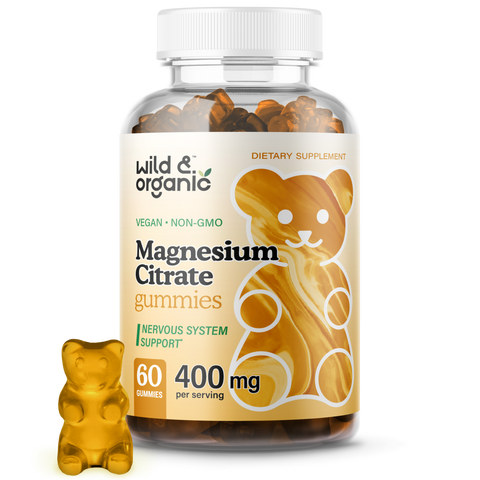Magnesium is a crucial mineral in the human body that plays a vital role in a multitude of physiological functions. Did you know that this essential nutrient is the fourth most abundant mineral in the body and it is a cofactor in over 300 enzyme systems in the body, regulating various biochemical reactions? This makes magnesium extremely important to support different bodily functions, including protein synthesis, muscle and nerve function, blood glucose control, and bone development.
However, acquiring the appropriate amount of magnesium is often challenging due to dietary restrictions, lifestyle, or health conditions, necessitating the need for magnesium supplements. There are different magnesium supplements types, such as citrate, oxide, chloride, and several others, each serving distinct purposes and offering unique benefits.
In this article, we delve deeper into the diverse magnesium types and benefits, exploring the differences among them and clarifying the distinct goals each form is designed to achieve.
Exploring the Difference in Magnesium Types, Benefits and Dosage
The Best Types of Magnesium: How Many Types of Magnesium Are There?
Magnesium is a versatile and essential mineral that our bodies require for optimal functioning. It is a central component in various biochemical reactions, contributing to bone health, energy production, nerve function, muscle relaxation, and the maintenance of heart health, among other critical roles.
There are different kinds of magnesium available, each with distinct properties, absorption rates, and therapeutic values. The diversity in magnesium forms ensures that individuals can select a supplement that best meets their health needs and personal preferences. Here are some of the most well-known types:
Magnesium Citrate
Magnesium citrate is one of the most common magnesium supplements, formed by combining magnesium with citric acid. It boasts a high bioavailability, meaning it is easily absorbed by the gastrointestinal tract.
Benefits:
- Promotes regular bowel movements and alleviates constipation.
- Supports bone health.
- Helps to maintain normal muscle and nerve function.
- Aids in the prevention of migraines.
- Helps normalize the sleep cycle.
Magnesium Oxide
This form consists of one magnesium atom bound to an oxygen molecule. It’s known for its high magnesium content per dose but has lower bioavailability compared to other forms.
Benefits:
- Effective for short-term relief from indigestion and heartburn.
- Can help improve bone density and prevent osteoporosis.
- Aids in migraine prevention.
Magnesium Malate
Magnesium malate combines magnesium and malic acid, a compound found in fruits and vegetables. It is highly bioavailable and gentle on the digestive system.
Benefits:
- Supports energy production due to the critical role of malic acid in the Krebs cycle.
- Helps alleviate muscle pain and fibromyalgia symptoms.
- Can assist in detoxifying aluminum from the body.
Magnesium Chloride
This form is created by combining magnesium with chlorine, and it is well-absorbed and quickly enters the blood cells.
Benefits:
- Supports cellular metabolism and energy production.
- Benefits kidney function.
- Plays a crucial role in detoxification processes.
Magnesium Sulfate
Commonly known as Epsom salt, magnesium sulfate is a chemical compound containing magnesium, sulfur, and oxygen.
Benefits:
- Known for relaxing and soothing muscle soreness, aches, and pains.
- Can aid in short-term constipation relief.
- Offers relaxation and stress relief when used in baths.
Magnesium Lactate
Magnesium lactate is the result of combining magnesium with lactic acid. It is well-absorbed by the body, making it an excellent choice for those with absorption issues.
Benefits:
- Helpful in managing digestive issues.
- Supports energy production.
- May assist in maintaining heart health and managing stress.
Magnesium Taurate
This is a combination of magnesium and the amino acid taurine, known for its high bioavailability and cardiovascular benefits.
Benefits:
- Supports cardiovascular health and maintains heart function.
- Improves mood and has a calming effect, reducing anxiety.
- Can help in maintaining healthy blood sugar (glucose) levels.
Magnesium L-Threonate
Magnesium L-threonate is a novel form of magnesium that has the ability to cross the blood-brain barrier, making it effective in impacting brain function.
Benefits:
- Supports cognitive function and brain health.
- May aid in improving learning abilities, memory, and mood.
- Assists in managing symptoms of neurodegenerative diseases.
Magnesium Glycinate
This form, combined with the amino acid glycine, is one of the most bioavailable and gentle forms of magnesium on the digestive system, making it suitable for those who are sensitive.
Benefits:
- Ideal for long-term use, given its gentleness on the stomach.
- May support bone health and density.
- Can have a calming effect on the brain and improve sleep quality.
Magnesium Orotate
Magnesium orotate combines magnesium with orotic acid, offering high bioavailability. It's frequently chosen for its cardiovascular and athletic performance benefits.
Benefits:
- Known to support heart health.
- Preferred by athletes for its role in improving endurance and aiding recovery.
- Helps maintain bone density and supports joint health.
- Involved in energy production, reducing fatigue.
What type of magnesium is best to take?
Well, there isn’t a one-size-fits-all answer! It varies significantly on individual health goals and needs. Every form of magnesium unfolds its unique attributes and health advantages, catering to diverse aspects of well-being. Looking to enhance sleep and maintain muscle function? Choose magnesium citrate. Need to enhance cellular metabolism and elevate energy levels? Magnesium chloride will be your ideal choice. The key is to align the selection with personal health aspirations and requirements to reap the maximum benefits each type extends.
Remember, that choosing the right form of magnesium is crucial. It requires an understanding of individual health needs, goals, and any pre-existing conditions. If you are not clearly sure about different magnesium types and uses, seek professional guidance. Your healthcare provider can explain all the magnesium differences and help you make a well-informed and personalized choice, enabling the achievement of balanced and holistic well-being.
What Happens When Taking Too Much Magnesium?
Deficiency in vitamins and minerals is well recognized as detrimental to one’s health, but it is equally important to acknowledge that an overdose can lead to even more serious complications. Just as with any supplements and medications, adhering strictly to the prescribed dosages and durations is imperative to avoid any adverse reactions.
This holds true for magnesium supplements as well, where excessive intake can result in a condition known as hypermagnesemia. While this condition is relatively rare due to the body's ability to expel excess magnesium through the kidneys, it still can occur, especially in individuals with impaired kidney functions. The symptoms of excessive magnesium consumption include nausea and vomiting, diarrhea, drowsiness, muscle weakness, irregular heartbeat, low blood pressure, and, in severe cases, cardiac arrest.
How Much Magnesium Do You Need to See the Results?
The recommended dosage of magnesium supplements can vary depending on several factors including age, sex, individual health conditions, and the presence of any deficiencies.
However, the Recommended Dietary Allowances (RDAs) provided by the National Institutes of Health (NIH) can serve as a general guideline:
- Adult men (19–30 years): 400 mg/day
- Adult men (31 years and above): 420 mg/day
- Adult women (19–30 years): 310 mg/day
- Adult women (31 years and above): 320 mg/day
- Pregnant women: 350–360 mg/day (before use, consultation with a healthcare provider is recommended)
- Breastfeeding women: 310–320 mg/day (before use, consultation with a healthcare provider is recommended)
Final Provisions
As seen from this article, magnesium is an indispensable mineral, playing a pivotal role in numerous physiological functions and biochemical pathways. It supports energy production, bone health, muscle relaxation, and neurological function, it has been also shown to improve sleep and even relieve stress and anxiety!
So, what are the different forms of magnesium? Here we discussed the most popular and effective ones: citrate, oxide, malate, chloride, sulfate, lactate, taurate, l-threonate, glycinate, and orotate. With a spectrum of available forms, each type of magnesium supplement offers distinct properties, bioavailability, and therapeutic values, enabling individuals to tailor their choice to meet specific health needs and preferences.
Why Choose Magnesium Supplements?
Wild & Organic offers one of the most bioavailable and effective forms of magnesium! Our natural Magnesium Citrate gummies are ideal for those struggling with stress, anxiety and a shattered nervous system. Besides, our vegan chews support your bones and joints, fortifying your skeletal system. Buy now and see how this mineral can improve your well-being!






